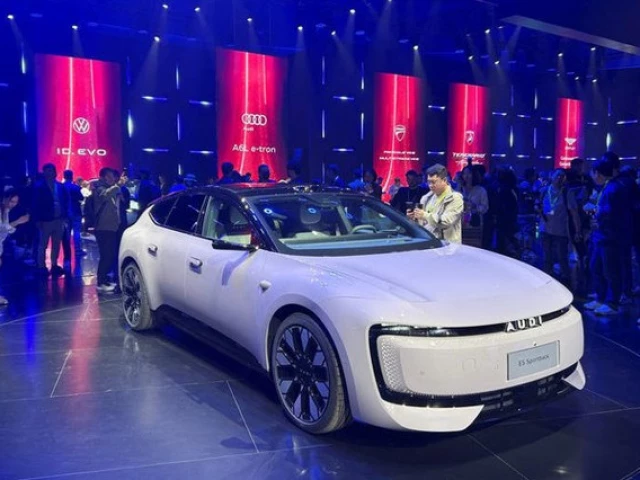Zeekr 001 shocks Audi: China's EV tech forces globals to license for speed.
The global auto design scene is being reshaped by Chinese EV tech

When Audi executives first encountered the Zeekr 001 in 2021—a long-range electric vehicle with European styling—it served as a stark wake-up call for the premium German automaker. Chinese technology was needed to compete with Chinese rivals.
"The Zeekr 001 back then shocked quite everyone," said Stefan Poetzl, president of SAIC Audi Sales and Marketing. "We needed to do something about it."
Audi developed the AUDI E5 Sportback in only 18 months to strengthen its EV offerings for Chinese buyers, leveraging technology from its Chinese partner SAIC, including batteries, electric powertrains, infotainment software, and advanced driver-assistance systems.
Audi plans to begin delivering the $33,000 EV to customers in China this month, and its global competitors are now turning to Chinese intellectual property to accelerate new model launches. For China-specific models, Toyota and Volkswagen have joint development initiatives, drawing on technology from Chinese partners GAC and Xpeng, respectively.
Renault and Ford aim to take it further by creating global models based on Chinese EV platforms, sources said. Renault did not respond to a request for comment. Ford declined to comment.
These licensing agreements represent an expanding yet modest revenue source for Chinese EV manufacturers and provide a fresh quid pro quo.
Global automakers rely on Chinese technology to overcome development challenges and introduce new EVs swiftly. At the same time, Chinese firms urgently require extra income amid a fierce domestic price war and escalating trade tensions overseas.
"It's a very clever, win-win arrangement," said Will Wang, general manager of Shanghai-based consulting firm Autodatas, which produces teardown analyses of top-selling EV models.
'CHINA INSIDE'
This emerging approach echoes the "Intel Inside" campaign of the 1990s, in which U.S. chip giant Intel leveraged cutting-edge components to elevate computers into premium devices.
Here, Chinese automakers offer EV technology as a complete package: the foundational elements for turnkey, white-label battery-electric vehicles, ideal even for low-volume producers with limited budgets.
Leapmotor (9863.HK) has teamed up with Stellantis (STLAM.MI) to market its EVs beyond China and is in discussions with other brands to license its technology, CEO Zhu Jiangming told Reuters.
Adopting a pre-engineered Chinese EV chassis and software could save billions in dollars and years of development time, helping legacy automakers close the gap with Chinese competitors, according to industry experts.
Renault (RENA.PA) was an early pioneer, producing the affordable Dacia Spring EV on a platform from China's Dongfeng for European sales beginning in 2021.
Renault has advanced further with the upcoming electric Twingo, being developed at its Shanghai research center, where Chinese EV engineering firm Launch Design is supplying technical expertise for the platform, according to two people familiar with the matter.
Launch did not respond to requests for comment.
Additional "China Inside" vehicles may arrive soon. Two people with knowledge of the situation said Ford is pursuing a Chinese collaborator to supply EV platform technologies. CEO Jim Farley has often tested Chinese EVs and recently commended Xiaomi's SU7 electric sedan.
Volkswagen has broadened its efforts to create China-tailored models across all powertrains, based on platforms jointly developed with Xpeng, incorporating the latter's designs for electronics and software.
Analysts note that established automakers often falter in crafting nimble EV architectures that support frequent updates, owing to their complex organizational setups.
That's why Volkswagen is exploring whether Xpeng's EV technologies can supplement or supplant its own, said Yale Zhang, managing director at Shanghai-based consultancy AutoForesight. If successful in China, Volkswagen might extend the approach worldwide, Zhang added.
A Volkswagen China spokesperson told Reuters that its partnership with Xpeng remains China-focused for now.
Xpeng's He Xiaopeng has indicated that the two companies aim to extend their collaboration beyond China. This would enhance Xpeng's revenue without the need for overseas factories, said Autodatas' Wang.
Oliver Wyman analyst Marco Santino noted that traditional automakers could harness the "firepower" of intense Chinese EV rivalry to surge ahead in development.
"You get a much more quality-proof product in the market in a shorter timeframe," Santino said.
MORE CHOICE?
Drawing inspiration from Tesla, China's EV producers have created modular platforms that reduce expenses, speed up development, and ease entry barriers. "They are quick learners from Tesla," said Forest Tu, a former executive at Chinese battery leader CATL (300750.SZ), who now runs consulting firm Mapleview Technology.
This edge is now substantial enough to support "licensing and royalty services" as Chinese EV makers venture abroad, Tu said.
CATL has embraced this model with Ford (F.N), licensing its technology for a battery facility.
Sharing Chinese technology could empower less-industrialized nations to establish their own "national EV brands," Tu added.
Abu Dhabi-based CYVN Holdings, a key investor in Nio (9866.HK), has crafted its own luxury EV using the Chinese company's chassis and software.
CYVN acquired British sports car brand McLaren in April and intends to market its EV under the McLaren name, according to two sources familiar with the matter. However, subsequent models will integrate much more McLaren "DNA" and less Chinese tech, one source noted.
Nio declined to comment. CYVN did not respond to a request for comment.
CATL's latest EV chassis, meanwhile, will enable consumers to "decide what an EV looks like, rather than having giant automakers decide what to sell," said its executive president Hu Guoliang.
The company announced it would scale up chassis output over the next three years following deals with several domestic automakers. Its Bedrock Chassis made its European debut this week at the IAA Mobility show in Munich.
Whether the reciprocal advantages of Chinese EV technology endure in the long run, though, is an uncertainty.
Former Aston Martin CEO Andy Palmer cautioned that while R&D savings are real, automakers should steer clear of excessive dependence on external tech. "In the long-term you're screwed because you're just a retailer," Palmer said.
Oliver Wyman's Santino warned that the primary hazard for legacy automakers is that"your capability to differentiate your brand is really limited." By integrating their own innovations, they can "limit the risk," Santino suggested.


















COMMENTS
Comments are moderated and generally will be posted if they are on-topic and not abusive.
For more information, please see our Comments FAQ